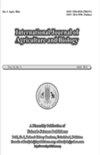Expression Changes of Genes Related to Germination Based on EST Database under Priming Treatment by Gibberellic Acid in Perilla frutescens (Korean Perilla)
Q2 Agricultural and Biological Sciences
引用次数: 0
Abstract
It is very important to establish an optimal seed priming process in order to increase the vitality of the seeds and promote the metabolism for the germination of the seeds. The optimum concentrations and species of priming agents to improve seed germination of both medicinal plants were also estimated. To improve the germination rate of Perilla frutescens(Korean perilla) seeds, various seed priming agents were used to analyze seed germination rates in the Saeyeopsil, Okdong and 141 collection Korean perilla cultivars. The agents used for seed priming were CaCl2, Ca(NO3)2, NaCl, K3PO4, polyethylene glycol, and gibberellic acid (GA3). When 0.1 mMGA3was used for seed priming, germination rates of Okdong, and the 141 collection showed a greater than 70% increase compared to the controls. Nine genes were selected for expression analysis by searching for genes related to seed germination and plant development in the EST(Expressed Sequence Tag) database of the Korean perilla cDNA library. GA3priming treatment for 1 d induced higher transcriptional levels of genes related to germination and plant developmentthan controls treated with water only. These genes were identified as protochlorophyllide reductase-like, magnesium-chelatase subunit ChlI, heme-binding protein 2-like, glyceraldehyde 3-phosphate dehydrogenase A, Chlorophyll a-b binding protein 6, B2 protein, 2-Cys peroxiredoxin BAS1, and 21 kDa protein. From these results, we suggest that when priming Korean perilla seeds with GA3, a large number of genes involved in plant development at early stages of seed germination play a role in improving the seed germination rate. Also, these induced genes are ideal candidate biomarkers for seed priming of Korean perilla. Specially, protochlorophyllide reductase-like is thought to be a potential gene for future molecular marker.© 2021 Friends Science Publishers基于EST数据库的赤霉素诱导下紫苏萌发相关基因的表达变化
为了提高种子的活力,促进种子的新陈代谢,建立一种最佳的催种工艺对种子的萌发具有重要意义。并对促进两种药用植物种子萌发的最佳起爆剂浓度和种类进行了估计。为了提高紫苏种子的发芽率,采用不同的发芽剂对沙叶、玉洞和141个收集的紫苏品种的种子发芽率进行了分析。引种剂为CaCl2、Ca(NO3)2、NaCl、K3PO4、聚乙二醇和赤霉素(GA3)。当0.1 mmga3用于种子激发时,玉洞和141的发芽率比对照提高了70%以上。通过在紫苏cDNA文库EST(Expressed Sequence Tag)数据库中搜索与种子萌发和植物发育相关的基因,选择9个基因进行表达分析。ga3引物处理1 d诱导的萌发和植株发育相关基因转录水平高于单纯水处理的对照。这些基因分别为原叶绿内酯还原酶样、镁螯合酶亚基ChlI、血红素结合蛋白2样、甘油醛3-磷酸脱氢酶A、叶绿素A -b结合蛋白6、B2蛋白、2-Cys过氧化物还氧蛋白BAS1和21kda蛋白。综上所述,我们认为GA3在北紫苏种子中引发大量种子萌发初期参与植物发育的基因对提高种子发芽率起作用。这些诱导基因是紫苏种子引种的理想候选生物标记物。特别是原叶绿内酯类还原酶被认为是未来分子标记的潜在基因。©2021朋友科学出版社
本文章由计算机程序翻译,如有差异,请以英文原文为准。
求助全文
约1分钟内获得全文
求助全文
来源期刊

International Journal of Agriculture and Biology
AGRICULTURE, MULTIDISCIPLINARY-
CiteScore
1.70
自引率
0.00%
发文量
40
审稿时长
5 months
期刊介绍:
Information not localized
 求助内容:
求助内容: 应助结果提醒方式:
应助结果提醒方式:


